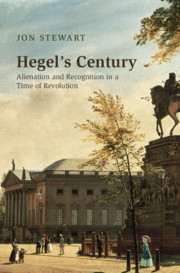Book contents
- Hegel’s Century
- Hegel’s Century
- Copyright page
- Dedication
- Contents
- Acknowledgments
- Preface
- Introduction
- Part I The Beginning
- Part II The First Generation
- 3 Heine, Alienation, and Political Revolution
- 4 Feuerbach’s Doctrine of the Humanity of the Divine in The Essence of Christianity
- 5 Bruno Bauer’s Criticism of Christianity
- Part III The Second Generation
- Bibliography
- Index of Names
- Subject Index
3 - Heine, Alienation, and Political Revolution
from Part II - The First Generation
Published online by Cambridge University Press: 14 October 2021
- Hegel’s Century
- Hegel’s Century
- Copyright page
- Dedication
- Contents
- Acknowledgments
- Preface
- Introduction
- Part I The Beginning
- Part II The First Generation
- 3 Heine, Alienation, and Political Revolution
- 4 Feuerbach’s Doctrine of the Humanity of the Divine in The Essence of Christianity
- 5 Bruno Bauer’s Criticism of Christianity
- Part III The Second Generation
- Bibliography
- Index of Names
- Subject Index
Summary
Chapter 3 is dedicated to Hegel’s student, the poet Heinrich Heine. It provides an account of Heine’s life and his personal relations to figures such as Hegel and Marx. An analysis is given of Heine’s On the History of Religion and Philosophy in Germany, with specific attention paid to the role he ascribes to Hegel. Heine portrays Kant and Fichte as philosophers of the revolution and Schelling as the philosopher of the Restoration. If Schelling is the villain, then Hegel is the hero of the story of German philosophy that Heine wants to tell. Hegel is portrayed as the high point of the development of the revolution of German thought. Heine compares the revolution of the mind that took place in Germany with the French Revolution that took place in the real world. He predicts a great German revolution that will begin a new period in European history. An interpretation is given of Heine’s poem “Adam the First,” which takes up some of the motifs from Hegel’s analysis of the Fall. An account is also given of Heine’s “The Silesian Weavers,” a poem written on occasion of the rebellion of weavers in Silesia in Prussia in 1844.
Keywords
- Type
- Chapter
- Information
- Hegel's CenturyAlienation and Recognition in a Time of Revolution, pp. 67 - 88Publisher: Cambridge University PressPrint publication year: 2021

